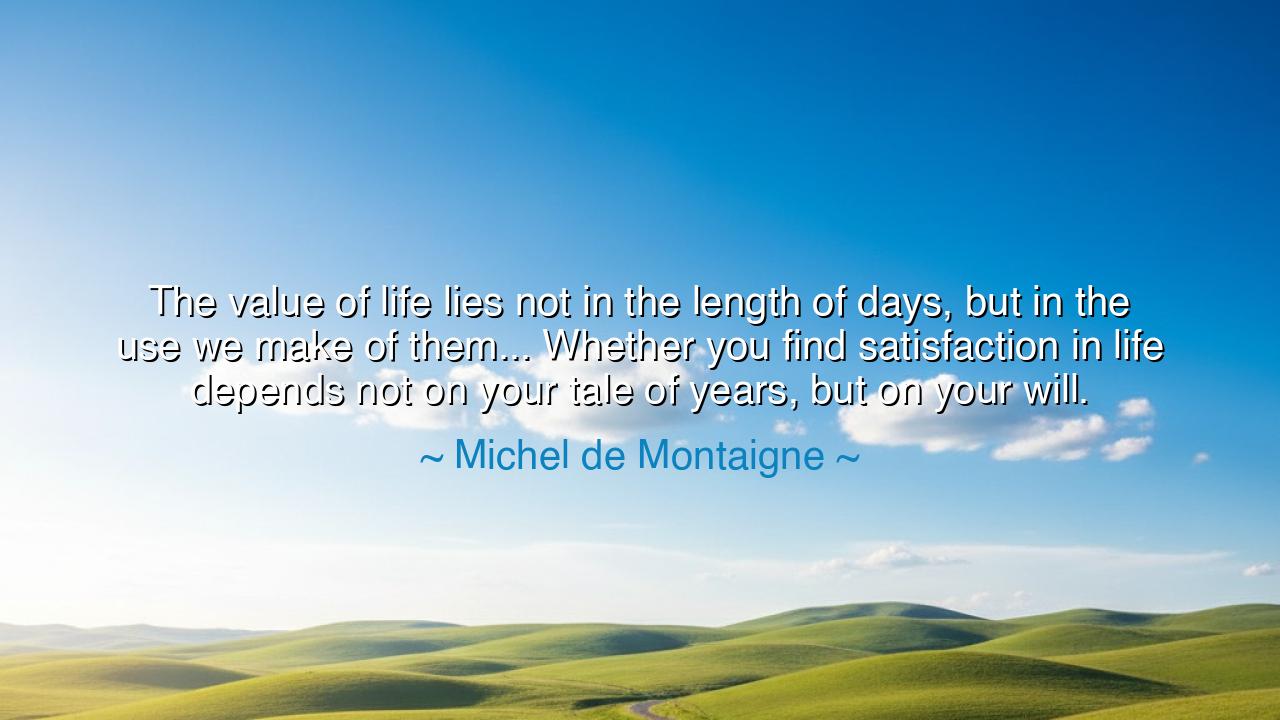
The value of life lies not in the length of days, but in the use
The value of life lies not in the length of days, but in the use we make of them... Whether you find satisfaction in life depends not on your tale of years, but on your will.






Michel de Montaigne, the philosopher who peered deeply into the heart of human existence, left us words that burn with timeless wisdom: “The value of life lies not in the length of days, but in the use we make of them... Whether you find satisfaction in life depends not on your tale of years, but on your will.” In this utterance, the vanity of counting days is stripped away, and the true measure of existence is revealed. For what is a long life without purpose, if its hours slip away unmarked, wasted like water into sand? And what is a short life, if lived with intensity, courage, and meaning, but a flame that burns brighter than centuries of dull existence?
The ancients knew this well. They did not worship time, but the deeds done within it. The life of Achilles was short, yet sung in immortal verse, because he filled his years with valor and choice, not mere survival. Meanwhile, many kings reigned long but are forgotten, for though they lived, they did not truly live. Thus Montaigne reminds us: the value of life is not a number carved into stone, but a force that springs from how we shape our days.
Let us look upon the story of Anne Frank, a child whose life was cut short in the shadows of tyranny. She did not live long, yet her diary, filled with hope, thought, and truth, has spoken across generations. Though her tale of years was brief, her will—to see beauty amidst suffering, to cling to dignity in the face of oppression—made her life a lantern for all who came after. Is this not proof of Montaigne’s wisdom? That the greatness of a life is measured not in its length, but in the courage with which it is lived?
To live well, then, is not to live endlessly, but to live intentionally. A day used for kindness, for love, for growth, outweighs a hundred days squandered in idleness. The merchant who spends years hoarding gold but never shares joy dies poorer than the beggar who, in one moment, gives bread to the hungry. Satisfaction, Montaigne tells us, lies not in the calendar of years, but in the will—the inner fire that drives us to use what we have with wisdom and passion.
O children of tomorrow, heed this teaching: do not fear a short life; fear a wasted one. Do not envy the years of others, but measure your own by the quality of your deeds. The scroll of your days will end whether it is long or brief; what matters is whether the ink upon it tells a tale worth reading. The will is your scribe, and every choice is a line written upon eternity.
The lesson is clear: guard your days as a treasure, but spend them with courage. Do not delay the song of your heart until old age, for old age may never come. Do not wait for “enough time,” for time is never enough, but your will can make each moment vast. A smile given today, a task done with diligence, a truth spoken with honesty—these small acts fill a life with greater weight than decades of hesitation.
Therefore, live as Montaigne counsels: measure not in years, but in worth. Rise each day not asking, “How long will I live?” but “How fully shall I live today?” And when your days are finished, whether they be many or few, you will not fear their number, for your will shall have transformed them into something eternal.
So remember: the value of life is not carved in the length of your years, but in the will with which you dare to live them. Live boldly, live wisely, live with love—and your life, no matter how brief, will be richer than a thousand unmarked days.






AAdministratorAdministrator
Welcome, honored guests. Please leave a comment, we will respond soon